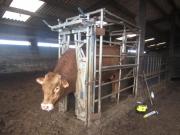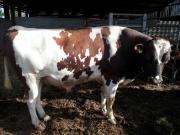

Bulls are responsible for 50% of your herd’s fertility. A fertile bull should be able to serve 50 disease free, cycling cows and get 95% of them in calf in 9 weeks. Sterile bulls (which are completely incapable of getting cows in calf) are very rare, but between 20% and 30% of bulls may be sub-fertile. Sub-fertile bulls will get some animals pregnant, but it will take more time and several services.
The consequence of an underperforming (sub-fertile) bull is either more empty cows at the end of the breeding season or a spread calving pattern. This is not only a nuisance, but also results in less calves to sell and a big variety in the calves’ ages. Age variation of calves will not only have an impact on the marketability of the calves, it will also have a big impact on calf health.
Keeping a defective bull can be a costly business. Bulls can become sub-fertile at any time during their breeding life. At St Boniface Farm Vets we recommend for all breeding bulls to be tested annually 4-6 weeks before the start of the breeding season.
The procedure entails:
- General physical exam of the bull, looking particularly at conformation and for lameness.
- Scrotal exam and measurement
- Rectal exam to check internal sex glands
- Examination of the sheath and penis
- Collection of semen, using an electro-ejaculator
- On farm examination of semen under a microscope for instant assessment and results

